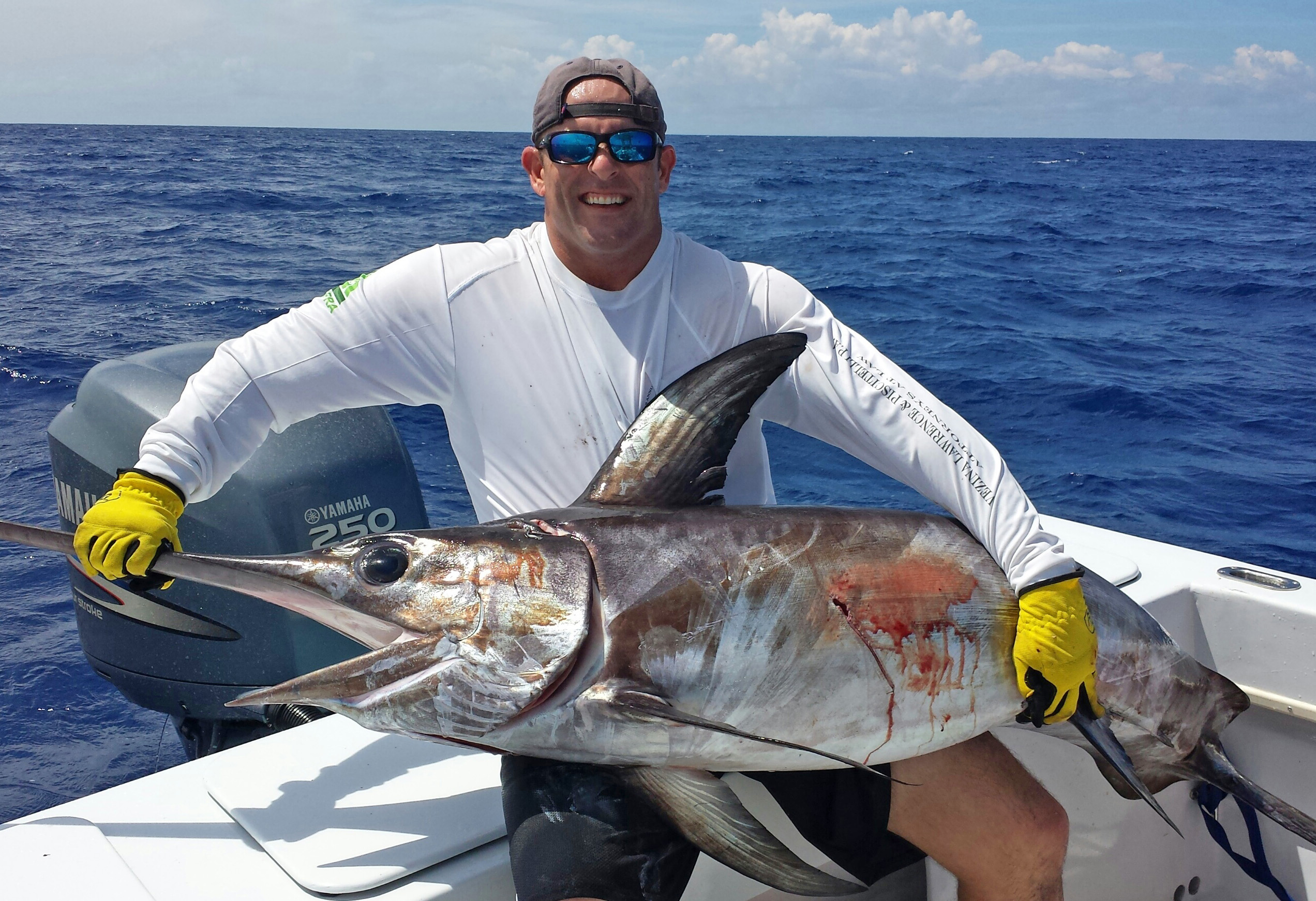October 11, 2016
By Jeff Weakley
 Swordfish bite has been hot in Florida. Reader Britt Stephens got this one out of Fort Pierce in 1,500 feet.
Swordfish bite has been hot in Florida. Reader Britt Stephens got this one out of Fort Pierce in 1,500 feet.
Impending collapse of ocean fisheries? Not happening here in the United States, and definitely not here in Florida. If anything, recreational anglers are likely feeling over-regulated at this point.
And yet, if we briefly overlook lingering problems in fisheries management, most of us would likely feel grateful that populations of swordfish, marlins, tunas, groupers and snappers appear to be stabilizing or even rebounding. That is due to better management. When fisheries managers search for data, they are doing so to ensure that future generations of anglers will get chances to catch fish. There are voluntary avenues for anglers to participate in management, and then there are a few which are legally required. Licenses and special permits are among the latter.
One way the government determines the health of a fish is through surveys of anglers. These surveys determine factors such as fishing effort and catch composition. In order to get the most accurate sample, the government may require some groups of fishermen—small subsets of the overall angling public—to sign up for a special permit, an identifier of sorts.
Two that Florida recreational anglers need to know about are the Highly Migratory Species (HMS) Angling permit, and the Gulf Reef Fish Survey (charter captains have many others that they'll need to consider).
The HMS Angling Category permit is a $20 annual “vessel permit” that covers all anglers aboard a particular boat. It's valid from January 1 through the end of December. Fishermen who pursue sailfish, marlin, sharks, swordfish and most tunas in federal waters must be covered by an HMS permit. There are a few gray areas, such as catch-and-release of sailfish within the first 3 miles of shore, or the capture of sharks in state waters. But, if you think you might want to keep that lucky yellowfin tuna or one day go for swords, get the HMS permit!
Margo Schulze-Haugen, Chief of HMS Division at NOAA Fisheries, said that, “The HMS permit system provides a number of benefits. It gives us an idea of the universe of people fishing recreationally for HMS. It allows us to do analyses of the impacts of fishing, and regulations for the community. And, we can share information with them.”
Schulze-Haugen said HMS permit-holders may be sent surveys through the mail. Or, one might meet an HMS researcher doing a dockside intercept survey, asking questions about the catch. Responses to such surveys are voluntary. However, landings of some HMS species, such as swordfish and blue marlin, must be reported directly to the HMS division.
Schulze-Haugen said annual sales of the HMS Angling permits hover around 20,000. To buy a permit, see hmspermits.noaa.gov.
Of course, Florida state fishing licenses are also required of most anglers fishing under the HMS vessel permit.
Gulf Reef Fish Survey
This is relatively new survey that the state of Florida initiated in order to quantify how many anglers are going for snappers and groupers in the Gulf of Mexico. Among other benefits, the data could help firm up the recreational angler's stake in these great fisheries.
An important difference between the Reef Fish Survey and the HMS or other recreational licenses: This one is free.
Throughout the year, FWC researchers will contact some people who have signed up for the Gulf Reef Fish Survey via mail and ask them to fill out a brief questionnaire on recent fishing trips. Anglers are not required to fill out these questionnaires, but the FWC says participation will help improve recreational data.
Gulf Reef Fish Survey signup is mandatory for anglers (including those 65 and older) fishing in the Gulf of Mexico (excluding Monroe County) from a private boat, who plan to harvest, possess or land any of the following reef fish: red and vermilion snapper; gag, black and red grouper; gray triggerfish; greater and lesser amberjack; banded rudderfish; and almaco jack.
If you are fishing from a for-hire vessel, you do not need to sign up for the Gulf Reef Fish Survey. Anglers under 16 years of age and those fishing from a vessel that has a vessel recreational fishing license also do not need to sign up.
To sign up, visit License.MyFWC.com and click “Purchase a License” and add “Gulf Reef Fish Angler” to your cart. You can also sign up at tackle shops, sporting goods stores and tax collector offices or by phone at 888-347-4356. Renewal is on an annual basis. FS
First published Florida Sportsman Magazine February 2016

